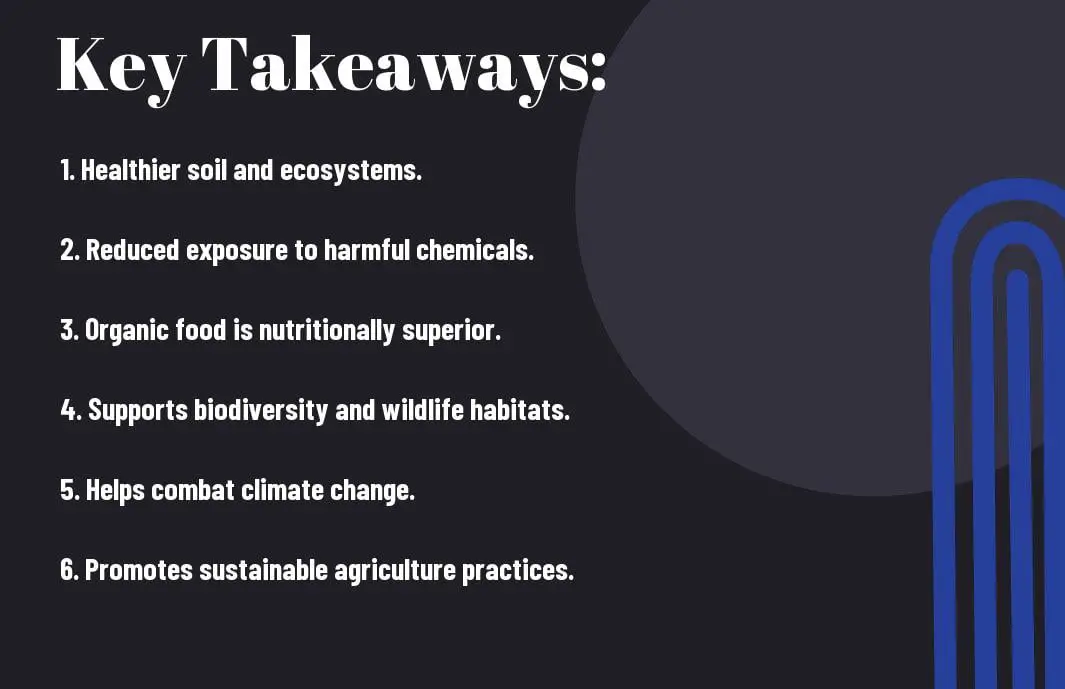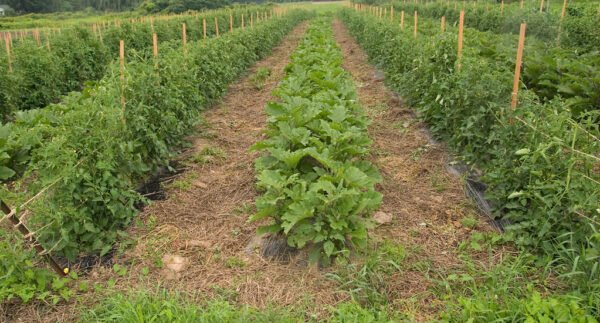There’s no denying the significant benefits that organic farming brings to the agriculture industry. By eliminating the use of synthetic pesticides and fertilizers, organic farming practices promote soil health, preserve biodiversity, and protect water quality. With a focus on sustainable techniques, such as crop rotation and composting, organic farmers can reduce environmental impact and improve ecosystem resilience. Consumers also benefit from organic farming through nutrient-dense produce and reduced exposure to harmful chemicals. The shift towards organic farming is not only beneficial for the environment but also for the health and well-being of both consumers and farmers.
Key Takeaways:
- Environmental sustainability: Organic farming techniques help reduce pollution, conserve water, and improve soil quality, leading to a more sustainable agricultural system.
- Healthier produce: Organic farming avoids the use of synthetic pesticides and fertilizers, resulting in fruits and vegetables that are free from harmful chemicals and richer in nutrients.
- Biodiversity preservation: Organic farming promotes the diversity of plant and animal species, creating balanced ecosystems that are more resilient to disease and climate change.

Environmental Impacts
Soil Health and Biodiversity
One of the key benefits of organic farming is its positive impact on soil health and biodiversity. By avoiding the use of synthetic pesticides and fertilizers, organic farming maintains the natural fertility of the soil and promotes the growth of beneficial microorganisms. This, in turn, leads to improved soil structure, better water retention, and increased nutrient availability for plants. Additionally, organic farming practices such as crop rotation and intercropping help to enhance biodiversity by providing habitats for a variety of plants and animals.

Environmental studies have shown that organic farms have higher levels of soil organic matter and greater microbial diversity compared to conventional farms. This indicates that organic farming not only benefits the soil itself but also contributes to the overall health of the ecosystem. By preserving soil health and promoting biodiversity, organic farming helps to sustain long-term agricultural productivity and reduce the reliance on synthetic inputs.
Water Quality and Conservation
Health One of the most significant environmental benefits of organic farming is its positive impact on water quality and conservation. Organic farms utilize practices that help to minimize water pollution from agricultural runoff, such as avoiding the use of synthetic chemicals that can leach into water sources. By maintaining healthy soil through organic practices, water infiltration and retention are improved, reducing the risk of erosion and runoff.

Organic farming also promotes water conservation by using techniques such as mulching and cover cropping, which help to retain soil moisture and reduce the need for irrigation. By reducing water waste and pollution, organic farming contributes to overall environmental sustainability and helps to protect valuable water resources for future generations.
A comprehensive study conducted by the Environmental Working Group found that organic farming practices help to protect water quality by reducing pesticide contamination in water sources. This not only benefits aquatic ecosystems but also ensures safer drinking water for communities surrounding organic farms.
Health Benefits
Despite the ongoing debate on the benefits of organic farming, there is substantial evidence supporting the positive impact it can have on human health. From nutritional advantages to reduced chemical exposure, organic farming offers a range of health benefits that contribute to overall well-being.
Nutritional Advantages of Organic Produce
On top of being free from synthetic pesticides and fertilizers, organic produce has been found to contain higher levels of imperative nutrients such as vitamins, minerals, and antioxidants. Studies have shown that organic fruits and vegetables can have up to 60% more antioxidants, which play a crucial role in combating harmful free radicals in the body and reducing the risk of chronic diseases like cancer and heart disease.

In addition, organic farming practices prioritize the quality of the soil, which in turn leads to plants with stronger immune systems. This means that organic crops have a higher resistance to pests and diseases, reducing the need for chemical interventions and ultimately resulting in a purer, healthier product for consumers to enjoy.
Reduction of Chemical Exposure
One of the most significant health benefits of organic farming is the reduction of chemical exposure to toxic pesticides and herbicides. Conventional agriculture relies heavily on these chemicals to control pests and boost yields, but the residues left behind on food can pose serious risks to human health. By choosing organic products, consumers can significantly lower their intake of these harmful substances and minimize potential health hazards.
Exposure to synthetic chemicals has been linked to a range of health issues, including hormone disruption, neurological disorders, and cancer. By supporting organic farming practices, individuals can not only protect their own health but also contribute to a more sustainable and environmentally friendly food system.
Economic and Social Advantages
Profitability for Farmers
Unlike conventional farming methods, organic farming offers various economic benefits for farmers. One of the key advantages is the potential for higher profits as organic products typically fetch a premium price in the market. By eliminating the need for expensive synthetic inputs and reducing reliance on costly machinery, organic farmers can often achieve better profit margins on their produce.
Moreover, organic farming practices help in reducing long-term costs associated with soil degradation and environmental damage. By promoting sustainable farming techniques such as crop rotation and natural pest control, organic farmers can maintain the fertility of their land, resulting in increased yields over time without the need for chemical interventions.
Community and Consumer Impact
For local communities and consumers, choosing organic products has a significant impact on both social and environmental levels. Buying organic supports local farmers and encourages sustainable agricultural practices that prioritize soil health and biodiversity preservation. This, in turn, helps in creating a more resilient and self-sufficient food system that is less dependent on external inputs.
This heightened consumer awareness also extends beyond individual health benefits to a broader understanding of the interconnectedness of agriculture and ecosystems. By opting for organic products, consumers actively participate in the movement towards a healthier planet and contribute to the protection of imperative natural resources for future generations.
Challenges and Limitations of Organic Farming
Production and Yield Issues
Limitations in organic farming often revolve around production and yield issues. One of the main challenges is the lower yield potential compared to conventional farming methods. Organic farmers rely on natural fertilizers and pest management techniques, which may not be as effective or efficient as synthetic chemicals. This can lead to lower crop yields and challenges in meeting the high demand for organic produce.

Moreover, organic farming practices require more labor-intensive management strategies, such as hand weeding and crop rotation. This can increase production costs and make it harder for organic farmers to compete economically with conventional agriculture.
Certification and Regulation
The process of certification and regulation is another significant challenge in organic farming. In order to label products as organic and fetch premium prices in the market, farmers must adhere to strict guidelines and undergo rigorous certification processes. These regulations ensure that organic produce meets certain standards and does not contain harmful chemicals or genetically modified organisms.
However, obtaining and maintaining organic certification can be costly and time-consuming for farmers, especially small-scale producers. The paperwork, inspections, and record-keeping requirements can be overwhelming, posing a barrier for some farmers to transition to organic practices.
Final Words
Following this exploration of the benefits of organic farming in agriculture, it is evident that transitioning to organic practices can lead to numerous advantages for farmers, consumers, and the environment. By promoting soil health, biodiversity, and food safety, organic farming offers a sustainable alternative to conventional agriculture that addresses many of the challenges faced by our current food system. With continued support and investment, organic farming has the potential to play a crucial role in creating a more resilient and environmentally friendly agricultural industry for future generations.
FAQ
Q: What is organic farming?
A: Organic farming is a method of agriculture that relies on natural processes and products instead of synthetic chemicals to improve soil fertility, control pests, and enhance plant growth.
Q: What are the benefits of organic farming in agriculture?
A: Organic farming promotes biodiversity, reduces pollution, conserves water, and improves soil quality. It also produces nutritious and flavorful crops while avoiding the use of harmful pesticides and fertilizers.
Q: How does organic farming contribute to sustainability?
A: Organic farming practices help maintain ecosystems, support rural communities, and protect the health of both farmers and consumers. By using methods that work with nature, organic farming ensures a more sustainable and environmentally-friendly approach to agriculture.



